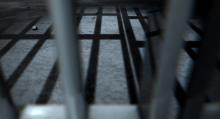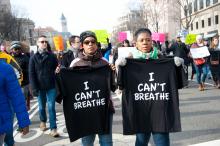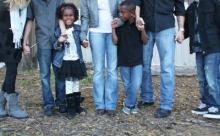Racism
BORDERED BY strip malls, chain restaurants, and drug stores, four-lane Hillsboro Pike in Nashville, Tenn., carries cars from the Vanderbilt University area out to suburban neighborhoods. Every afternoon, thousands of drivers heading home from the city crest a ridge and pass a long, red-brick church.
That church, Calvary United Methodist, is where I was confirmed, participated in youth group, and sang in the choir. In the archives room off the education wing, a visitor can open a filing cabinet drawer, flip past photos of youth group retreats and church league basketball games, and find a manila folder labeled “Rev. Dr. Sam Dodson, 1958-1965.”
The folder is thin, but its contents are weighty. A letter to the local Methodist bishop from the church’s board explains that Dodson cannot adequately minister to his congregation while participating in political activities and suggests he be demoted to assistant pastor. A newspaper clipping from 1965 announces that Rev. Dodson and his family will be moving to Athens, Greece, where he will head St. Andrew’s American Church. I recognize some of the names signed to letters calling for Dodson’s demotion—an usher who pressed strawberry candies into my palm whenever I asked, a woman who looked me in the eye when I was 11 and told me I would be a leader in the church someday.


National Guard Sgt. Valerie Deant found mugshots of black men, including one of her brother, riddled with bullet holes at a police range in south Florida last month. After outraged critics drew attention to the police department, clergy across the country began to post photos of their own faces with the hashtag #UseMeInstead. The Washington Post explains why the hashtag began:
The effort was “motivated by our service to Christ and his call to love our neighbors,” Gonnerman told The Post.
“We initially started thinking if a whole lot of us, in our clergy collar and worship attire, sent our photos to them, it would make a really powerful statement,” Rev. Kris Totzke, a pastor in Texas, told The Post. “Then, it really snowballed, and we got people all over the country and of all different faiths.” …
“It’s such a desensitization thing, that if you start aiming at young black men, and told to put a bullet in them, you become desensitized,” Gonnerman said. “Maybe, to change the picture, it’s you know what, dare ya, shoot a clergy person.”


The Bureau of Prisons contacted me today, assigning me a prison number and a new address: for the next 90 days, beginning tomorrow, I’ll live at FMC Lexington, in the satellite prison camp for women, adjacent to Lexington’s federal medical center for men. Very early tomorrow morning, Buddy Bell, Cassandra Dixon, and Paco and Silver, two house guests whom we first met in protests on South Korea’s Jeju Island, will travel with me to Kentucky and deliver me to the satellite women’s prison outside the Federal Medical Center for men.
In December 2014, Judge Matt Whitworth sentenced me to three months in federal prison after Georgia Walker and I had attempted to deliver a loaf of bread and a letter to the commander of Whiteman Air Force base, asking him to stop his troops from piloting lethal drone flights over Afghanistan from within the base. Judge Whitworth allowed me more than a month to surrender myself to prison; but whether you are a soldier or a civilian, a target or an unlucky bystander, you can’t surrender to a drone.
When I was imprisoned at Lexington prison in 1988, after a federal magistrate in Missouri sentenced me to one year for planting corn on nuclear missile silo sites, other women prisoners playfully nicknamed me “Missiles.” One of my sisters reliably made me laugh today, texting me to ask if I thought the women this time would call me “Drones.”
It’s good to laugh and feel camaraderie before heading into prison. For someone like me, very nearly saturated in “white privilege” through much of this arrest, trial, and sentencing process, 90 percent (or more) of my experience will likely depend on attitude.




I am the Dean of Students at Covenant Theological Seminary, the National Seminary of the Presbyterian Church in America (PCA). I am the pastor of South City Church in Saint Louis. South City Church is a PCA congregation, and it is predominantly white. I am a retired full colonel PCA Army chaplain. I was born and raised in North Saint Louis city. My father now lives in Ferguson, Mo. I am a black man. If that comes as a shock, believe me I understand; it is a shock to me every morning when I wake up and go to work at Covenant Seminary in West Saint Louis County, a mostly wealthy and white suburb. It shocks me every time I walk into my church in South Saint Louis and remember that I am one of only 47 black pastors in my denomination and that I work in a mostly white conservative, evangelical church. I am constantly at the feet of Jesus asking for help in navigating the racial, cultural, and generational waters around me. It is a wonderful opportunity, but it is challenging for someone like me; I grew up believing that white people never really wanted to be in close proximity to black people unless they were the ones controlling the situation. There was also the belief that the only black people who were successful in white organizations were the ones who did not mind being tokens without real dignity in the system. There may be people who believe these things about me. I have even questioned myself as to why I have been given so many opportunities in the PCA. I sometimes don’t like the answers that come to mind.
Recently, a young pastor asked my opinion on cross-cultural ministry. He asked me how an African American got two positions as both Covenant’s Dean of Students and as pastor of South City Church. I explained, “it makes no sense, since so much of the history in our denomination makes me the wrong guy for the job! But through God’s sovereign will, here I am!” His response was, “I guess God always sends the wrong messenger.”

Maybe I am the only one wondering “What can I do?” as I watch and read the news of demonstrations throughout the country. I have a lot of excuses. I can’t go to the protests tonight because my son has a concert. I don’t coordinate the church service and announcements, so I can’t control what will and won’t be said. I’m on sabbatical so I won’t be a part of the conversations that I hope will happen between colleagues at meetings. But I hope I am not the only one wondering what can be, needs to be, ought to be done.
The videos are chilling – Eric Garner’s life is being choked out of him until he goes limp on the sidewalk and Tamir Rice is being gunned down, the police squad door barely opening as the officer drives by. The images of protests and protesters being tear gassed and throwing canisters back at police armed in riot gear remind me of the summer I spent in Korea, marching in protests against U.S. military presence. That was the summer I learned about wearing damp handkerchiefs near my eyes and over my nose to help with the sting of tear gas and how to wet the wick of a homemade Molotov cocktail before lighting and lobbing. A few years later in a hotel room in Indiana after a job interview, I watched protests and riots take over Los Angeles. Living with, wrestling with injustice day in and day out is a bit like a kettle of water just about to hit boiling. At some point, the water boils, the steam is released.





Hope is not a feeling. It is a decision — a choice you make based on what we call faith or moral conscience, whatever most deeply motivates you.
I have said that for many years, but this Advent and Christmas season tests my words — even in my own heart.
This is not a time that many of us are feeling a great deal of hope. I hear that from many friends and allies as well.
In fact, many events this year feel like they have sucked the hope right out of us.
And yet, even in the midst of terrible events and stories, the possibilities of hope still exist depending on what we decide to do for reasons of faith and conscience. In fact, people of faith and conscience are already making a difference in the most difficult situations and places.
And that gives me hope. This season of Advent, in the Christian tradition, is a call to patient waiting.
Christmas is the celebration of God literally coming into the world in order to change it.

Before she and her husband adopted a son and daughter from Ethiopia, popular evangelical blogger Jen Hatmaker said she had a different view about race in America.
“A couple years ago, I would’ve said we’re moving to a post-racial society because I was so under-exposed to people of color and the issues they deal with on a daily basis,” said the white Christian author, whose home renovation to make space for their growing family of seven was recently featured on HGTV.
As evangelicals have turned their attention toward adoption in the past decade, families like the Hatmakers are grappling with race relations in a profoundly personal way, especially as national news spotlights racial tension in New York, Ferguson, Mo., and elsewhere.
And evangelicals aren’t alone: A new Gallup poll found that 13 percent of Americans believe racism is the country’s most important problem, the highest figure since the 1992 verdict in the Rodney King case sparked riots in Los Angeles.
And, as Gallup noted: “After barely registering with Americans as the top problem for two decades, race relations now matches the economy in Americans’ mentions of the country’s top problem, and is just slightly behind government (15 percent).”


